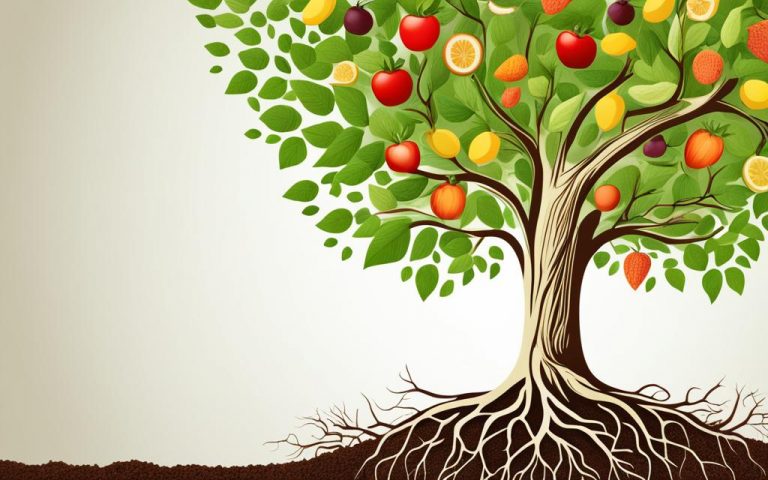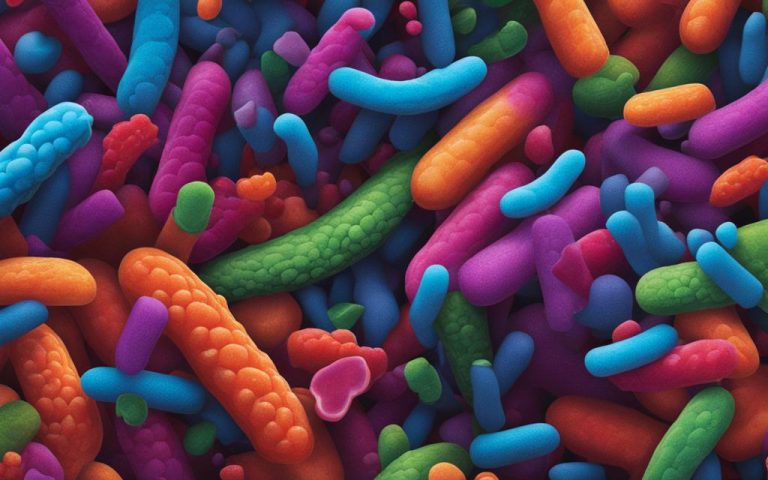Probiotics to Help with Constipation: Natural Relief
Are you struggling with constipation? You’re not alone. Many people look for natural ways to ease their discomfort. Probiotics are now seen as a possible solution for better gut health. These friendly bacteria can help balance your digestive system and make bowel movements regular.
This article will look into how probiotics can help with constipation and why they’re a top choice for natural relief. You’ll find out about the science behind these helpful bacteria. Plus, you’ll learn easy ways to add them to your daily routine for better digestive health.
Key Takeaways
- Probiotics offer natural relief for constipation
- These beneficial bacteria support gut health
- Specific probiotic strains target digestive issues
- Probiotic-rich foods can be easily added to your diet
- Supplements provide an alternative way to consume probiotics
- Lifestyle changes can enhance probiotic effectiveness
Understanding Constipation and Its Impact on Health
Constipation affects millions of Americans, making digestion hard and affecting overall health. Let’s look into what constipation is, why it happens, and its effects on health.
Defining constipation and its symptoms
Constipation means you have fewer bowel movements than usual, making it hard to pass stools. You might have hard, dry stools, strain when you go to the bathroom, or feel like you didn’t fully go. Most people go to the bathroom three times a week. Going less often is often seen as constipation.
Common causes of constipation
Many things can make your gut health worse and cause constipation:
- Lack of fiber in diet
- Dehydration
- Sedentary lifestyle
- Certain medications
- Stress
- Changes in routine or travel
Health risks associated with chronic constipation
Constipation over time can lead to serious health problems if not treated. These issues include:
| Risk | Description |
|---|---|
| Hemorrhoids | Swollen veins in the rectum due to straining |
| Anal fissures | Tears in the anus lining from hard stools |
| Fecal impaction | Hardened stool that can’t be expelled |
| Rectal prolapse | Rectum protrusion through the anus |
Keeping your digestive system regular is key for your health. By understanding constipation and its effects, you can work on improving your bowel habits and keeping your gut healthy.
The Gut Microbiome and Its Role in Digestive Health
Your gut is filled with trillions of tiny organisms, known as the gut microbiome. This group of microorganisms is key to your digestive health and overall health. They help with digestion, absorbing nutrients, and keeping bowel movements regular.
The balance of your gut microbiome affects how your digestive system works. If this balance is off, you might face issues like constipation. A healthy gut microbiome breaks down food, makes important vitamins, and supports your immune system.
Studies show that your gut microbiome touches many parts of your health, not just digestion. It can change your mood, metabolism, and even how your brain works. Keeping your gut microbiome diverse and balanced brings many health benefits.
“The gut microbiome is like a forgotten organ, silently working to keep our bodies in harmony.”
To help your gut microbiome, eat foods rich in probiotics like yogurt, kefir, and sauerkraut. These foods add good bacteria to your gut, keeping it healthy.
Learning about your gut microbiome is the first step to better digestive health. By taking care of your gut, you can enjoy many health benefits and improve your overall well-being.
What Are Probiotics and How Do They Work?
Probiotics are live microorganisms that help your gut when eaten in the right amounts. They support your digestive health and are key to staying healthy.
Types of Probiotic Strains
Probiotic supplements have many strains, each with special benefits. Some common ones are:
- Lactobacillus
- Bifidobacterium
- Saccharomyces
Mechanisms of Action in the Digestive System
Probiotics boost digestive health in several ways:
- They balance the good and bad bacteria in your gut.
- They make the lining of your intestines stronger.
- They create helpful compounds.
- They help your immune system work better.
Differentiating Between Probiotics and Prebiotics
Probiotics and prebiotics both aid gut health but in different ways:
| Probiotics | Prebiotics |
|---|---|
| Live microorganisms | Non-digestible fibers |
| Found in fermented foods and supplements | Found in prebiotic foods like garlic and onions |
| Directly introduce beneficial bacteria | Feed existing gut bacteria |
Knowing the difference helps you choose wisely between probiotic supplements and prebiotic foods. This way, you can get the best gut health benefits.
Probiotics to Help with Constipation: Scientific Evidence
Research shows promising results for using probiotics to help with constipation. Studies have found certain probiotic strains can improve digestive regularity. They also increase bowel movement frequency in many people struggling with constipation.
A review of 14 clinical trials found that probiotics increased weekly bowel movements by 1.3 on average. Compared to placebo treatments, participants also reported softer stools and reduced intestinal transit time when taking probiotics regularly.
Specific probiotic strains seem particularly effective for constipation relief:
- Bifidobacterium lactis BB-12 improved stool consistency and frequency in adults
- Lactobacillus rhamnosus GG reduced constipation symptoms in children
- A mix of Bifidobacterium longum, Lactobacillus acidophilus, and Streptococcus faecalis increased bowel movements in elderly patients
While results vary between individuals, the overall evidence suggests probiotics can be a safe, natural option to promote digestive regularity. Consult your doctor about incorporating probiotics if you struggle with chronic constipation.
“Probiotics appear to improve whole gut transit time, stool frequency, and stool consistency in adults with functional constipation.” – American Journal of Clinical Nutrition
As research continues, scientists are working to determine the most effective probiotic strains and dosages for constipation relief. Combining probiotics with a high-fiber diet and adequate hydration may provide the best results for improving bowel health.
Best Probiotic Strains for Alleviating Constipation
Probiotic supplements can be a big help if you’re dealing with constipation. They add good bacteria to your gut, helping to balance your microbiome and improve your intestinal health. Let’s look at three probiotic strains that are great for keeping your bowel movements regular.

Bifidobacterium lactis
B. lactis is a top choice among probiotics. It makes digestion more comfortable and helps you go to the bathroom regularly. It does this by making you go more often and boosting your gut health.
Lactobacillus acidophilus
L. acidophilus is another great option for easing constipation. It breaks down food better and helps you absorb nutrients. It also keeps your gut flora in balance.
Saccharomyces boulardii
S. boulardii is a yeast that acts like a probiotic. It’s really good at speeding up bowel movements and making stool softer. This can be a big help for people who often struggle with constipation.
| Probiotic Strain | Main Benefits | Recommended Daily Dose |
|---|---|---|
| Bifidobacterium lactis | Increases stool frequency | 1-10 billion CFU |
| Lactobacillus acidophilus | Improves nutrient absorption | 1-10 billion CFU |
| Saccharomyces boulardii | Reduces bowel transit time | 250-500 mg |
Keep in mind, how well probiotic supplements work can differ for everyone. It’s important to pick high-quality products and be patient. With time, these good bacteria can help balance your gut and make constipation better.
Incorporating Probiotic-Rich Foods into Your Diet
Eating foods high in probiotics is a great way to fight constipation. These foods are easy to add to your meals. They help your digestive system and overall health.
Yogurt is a top choice for probiotics. Choose yogurts with live cultures for the best benefits. Kefir, a fermented milk drink, has even more probiotics. For those who don’t like dairy, try kombucha or sauerkraut.
Prebiotics help probiotics work better in your gut. Here are some prebiotic foods:
- Bananas
- Onions
- Garlic
- Asparagus
- Whole grains
Add these prebiotics to your meals to feed the good gut bacteria. Put bananas on your morning yogurt or add sauerkraut to your lunch salad.
Using probiotics regularly helps with constipation. Make these foods a part of your diet for lasting gut health. Drink plenty of water and eat foods high in fiber too.
“Let food be thy medicine and medicine be thy food.” – Hippocrates
By eating probiotic and prebiotic foods, you’re taking a tasty step towards better digestion and relief from constipation.
Choosing the Right Probiotic Supplements for Constipation Relief
Finding the best probiotic supplements for constipation can be tough. There are many options out there. It’s key to know what to look for to help your digestion.
Key Factors in Supplement Selection
When picking probiotic supplements for constipation, keep these points in mind:
- Strain specificity for constipation relief
- Colony-forming units (CFUs)
- Shelf stability and storage requirements
- Quality and purity of ingredients
Recommended Dosages
The amount you need depends on the probiotic strain and your health. A common advice for probiotics to aid constipation is:
| Age Group | Recommended Daily Dosage (CFUs) |
|---|---|
| Adults | 10-20 billion |
| Children | 5-10 billion |
| Infants | 1-3 billion |
Potential Side Effects and Precautions
Probiotic supplements are usually safe, but some might feel bloating or gas. Start with a small dose and slowly increase it. If you have a weak immune system or serious health issues, talk to your doctor before starting probiotics for better digestion.
Lifestyle Changes to Support Probiotic Effectiveness
Improving your gut health with probiotics is more than just taking supplements. Your daily habits greatly affect how well probiotics work. Let’s look at some lifestyle changes that can help your gut and keep you regular.
Eating more fiber is key to beating constipation naturally. Try to get 25-30 grams of fiber each day from fruits, veggies, and whole grains. This feeds good gut bacteria and makes your stools easier to pass.
Drinking enough water is also crucial. Aim for 8 glasses a day to keep your digestive system running smoothly. Herbal teas can also help with hydration and offer extra digestive benefits.
Exercise is a great way to support your gut health. Try to do 30 minutes of moderate exercise most days. This can be walking, cycling, or swimming. Exercise helps move waste through your system better.
| Lifestyle Factor | Recommendation | Gut Health Benefits |
|---|---|---|
| Fiber Intake | 25-30 grams daily | Feeds beneficial bacteria, adds bulk to stools |
| Hydration | 8+ glasses of water daily | Softens stools, aids digestion |
| Exercise | 30 minutes, 5 days a week | Stimulates intestinal contractions |
| Stress Management | Daily relaxation practices | Reduces digestive disruptions |
Lastly, remember how stress affects your gut. Add stress-reducing activities like meditation, yoga, or deep breathing to your day. A calm mind helps a happy, healthy gut, making probiotics and other remedies work better.
Combining Probiotics with Other Natural Remedies for Constipation
Probiotics work well with other natural remedies for constipation. Pairing them with certain foods and habits boosts their effectiveness. Let’s look at some strong combinations to help your digestive health.
Increasing your fiber intake helps probiotics work better. Fiber moves waste through your intestines and feeds good gut bacteria. Try to get 25-30 grams of fiber each day from fruits, veggies, whole grains, and legumes.
Prebiotic foods are great with probiotics too. They have special fibers that feed good gut bacteria. Some top prebiotic foods include:
- Garlic
- Onions
- Asparagus
- Bananas
- Oats
Drinking enough water is key when using probiotics for constipation relief. Water makes stool softer and helps with digestion. Aim for 8-10 glasses of water every day.
Exercise can also boost probiotic benefits. It helps move your bowels and keeps digestion healthy. Try to exercise for at least 30 minutes most days.
| Natural Remedy | How It Supports Probiotics |
|---|---|
| Fiber-rich foods | Promotes regular bowel movements |
| Prebiotic foods | Nourishes beneficial gut bacteria |
| Hydration | Softens stool and aids digestion |
| Exercise | Stimulates bowel function |
By mixing these natural remedies with probiotic supplements or foods, you can make a strong plan for managing constipation and better gut health.
When to Consult a Healthcare Professional
Probiotics can help with constipation, but sometimes you need to talk to a doctor. If you have severe stomach pain, see blood in your stool, or lose weight without trying, get medical help right away.
Signs Your Constipation May Require Medical Attention
Long-term constipation can cause serious problems. Look out for signs like intense stomach pain, fever, or trouble passing gas. These could mean you need a doctor’s check-up.
Discussing Probiotic Use with Your Doctor
Before taking probiotic supplements, talk to your doctor. They can tell you which strains and amounts are best for you. This is very important if you have health issues or take other medicines.
Potential Interactions with Medications
Some probiotics might not mix well with certain medicines. For example, they could change how antibiotics or immunosuppressants work. Your doctor can help you avoid these problems and make sure your probiotics are safe and effective.
FAQ
What are probiotics, and how do they help with constipation?
Probiotics are live bacteria and yeasts that help balance gut health. They make sure your gut microbiome is healthy. Strains like Bifidobacterium lactis and Lactobacillus acidophilus help with constipation. They make digestion regular and increase how often you go to the bathroom.
What are the best probiotic strains for constipation relief?
For constipation, Bifidobacterium lactis, Lactobacillus acidophilus, and Saccharomyces boulardii are great. These strains fix gut balance and help you go to the bathroom regularly.
How can I incorporate probiotics into my diet for constipation relief?
Eat foods like yogurt, kefir, sauerkraut, kimchi, and kombucha for probiotics. Also, try prebiotic foods like bananas, onions, garlic, and whole grains. Or, you can take probiotic supplements, but pick a good one and follow the directions.
Are there any lifestyle changes that can enhance the effectiveness of probiotics for constipation?
Yes, eating more fiber, drinking water, exercising, and managing stress helps gut health. These changes make probiotics work better. Adding fiber supplements or prebiotic foods with probiotics can also help a lot.
When should I consult a healthcare professional about constipation and probiotic use?
See a doctor if constipation is severe or doesn’t go away, or if you have bleeding or pain. Always talk to a doctor before taking probiotics, especially if you’re on other medications. They can affect how well probiotics work.







